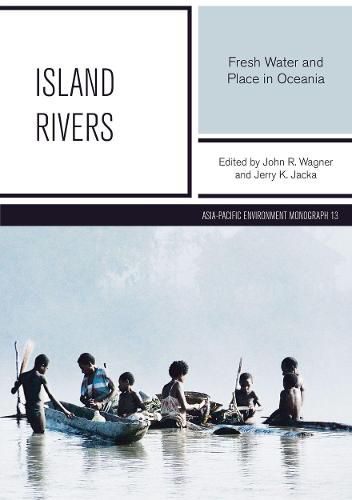Readings Newsletter
Become a Readings Member to make your shopping experience even easier.
Sign in or sign up for free!
You’re not far away from qualifying for FREE standard shipping within Australia
You’ve qualified for FREE standard shipping within Australia
The cart is loading…






Anthropologists
have written a great deal about the coastal adaptations and seafaring
traditions of Pacific Islanders, but have had much less to say about the
significance of rivers for Pacific island culture, livelihood and identity.
The authors of this collection seek to fill that gap in the ethnographic
record by drawing attention to the deep historical attachments of island
communities to rivers, and the ways in which those attachments are changing
in response to various forms of economic development and social change. In
addition to making a unique contribution to Pacific island ethnography, the
authors of this volume speak to a global set of issues of immense importance
to a world in which water scarcity, conflict, pollution and the degradation of
riparian environments afflict growing numbers of people. Several authors take
a political ecology approach to their topic, but the emphasis here is less on
hydro-politics than on the cultural meaning of rivers to the communities we
describe. How has the cultural significance of rivers shifted as a result of
colonisation, development and nation-building? How do people whose
identities are fundamentally rooted in their relationship to
a particular river renegotiate that relationship when the river is
dammed to generate hydro-power or polluted by mining activities? How do
blockages in the flow of rivers and underground springs interrupt the
intergenerational transmission of local ecological knowledge and hence the
ability of local communities to construct collective identities rooted in a
sense of place?
$9.00 standard shipping within Australia
FREE standard shipping within Australia for orders over $100.00
Express & International shipping calculated at checkout
Anthropologists
have written a great deal about the coastal adaptations and seafaring
traditions of Pacific Islanders, but have had much less to say about the
significance of rivers for Pacific island culture, livelihood and identity.
The authors of this collection seek to fill that gap in the ethnographic
record by drawing attention to the deep historical attachments of island
communities to rivers, and the ways in which those attachments are changing
in response to various forms of economic development and social change. In
addition to making a unique contribution to Pacific island ethnography, the
authors of this volume speak to a global set of issues of immense importance
to a world in which water scarcity, conflict, pollution and the degradation of
riparian environments afflict growing numbers of people. Several authors take
a political ecology approach to their topic, but the emphasis here is less on
hydro-politics than on the cultural meaning of rivers to the communities we
describe. How has the cultural significance of rivers shifted as a result of
colonisation, development and nation-building? How do people whose
identities are fundamentally rooted in their relationship to
a particular river renegotiate that relationship when the river is
dammed to generate hydro-power or polluted by mining activities? How do
blockages in the flow of rivers and underground springs interrupt the
intergenerational transmission of local ecological knowledge and hence the
ability of local communities to construct collective identities rooted in a
sense of place?